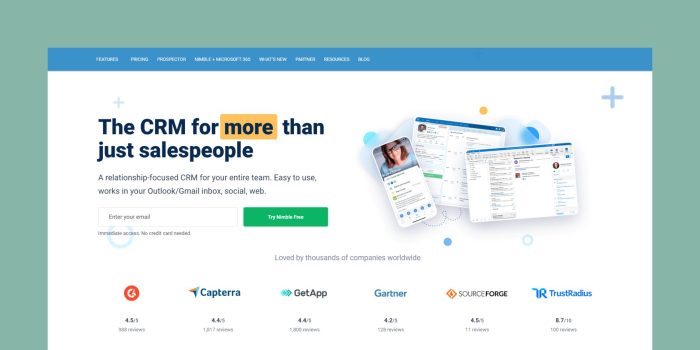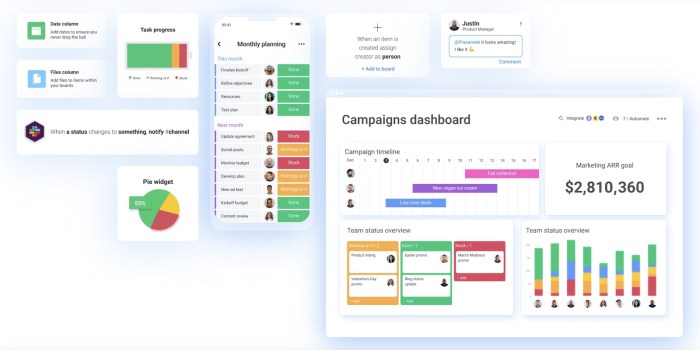Sales and marketing software for small business is revolutionizing how entrepreneurs connect with customers and drive revenue. This powerful tool streamlines processes, from lead generation to closing deals, enabling small businesses to compete effectively in today’s dynamic market. It empowers businesses with data-driven insights to optimize campaigns and improve customer engagement.
Choosing the right software can significantly impact a small business’s success. Careful consideration of features, scalability, and pricing is crucial. This guide will delve into the key factors to consider when evaluating options for your business.
Small businesses often face the challenge of juggling multiple tasks, from managing customer interactions to tracking sales data. Effective sales and marketing software can streamline these processes, boosting efficiency and ultimately, profitability. This comprehensive guide explores the crucial role of such software in supporting small business growth, highlighting key features, benefits, and considerations.
Understanding the Needs of Small Businesses: Sales And Marketing Software For Small Business
Small businesses operate with unique constraints compared to larger corporations. They often have limited resources, both in terms of budget and manpower. Sales and marketing software needs to be adaptable, affordable, and easy to use. This translates into features that help manage leads, automate tasks, track progress, and provide actionable insights.
Key Features to Look For
- CRM (Customer Relationship Management): A robust CRM system allows businesses to store and manage customer data, track interactions, and personalize communication. This fosters stronger customer relationships.
- Lead Management: Effective lead management tools help capture, qualify, and nurture leads through various stages of the sales funnel. This feature is crucial for converting prospects into paying customers.
- Marketing Automation: Automating marketing tasks like email campaigns, social media posting, and follow-ups frees up valuable time for other business activities. This is essential for scaling marketing efforts without extensive staff.
- Sales Forecasting and Reporting: Data-driven insights are critical for informed decision-making. Sales and marketing software should provide clear and concise reports on key metrics like sales performance, customer behavior, and marketing ROI.
- Integration Capabilities: The ability to integrate with existing accounting software, email platforms, and other business tools is crucial for seamless workflow and data synchronization.
Types of Sales and Marketing Software
Different software solutions cater to specific needs. Some popular options include:
CRM Software
CRM software focuses on managing customer interactions and relationships. Popular CRM platforms like Salesforce, HubSpot, and Zoho offer various features for lead management, sales tracking, and customer support.
Marketing Automation Software, Sales and marketing software for small business
Marketing automation tools help automate repetitive marketing tasks, such as email marketing, social media posting, and lead nurturing. Mailchimp, Constant Contact, and ActiveCampaign are popular choices for small businesses.
All-in-One Sales and Marketing Software
Many platforms offer a combined sales and marketing suite. This approach can be more efficient by consolidating all necessary tools into one interface. Examples include platforms like HubSpot, which provide both CRM and marketing automation capabilities.

Source: pandadoc-static.com
Choosing the Right Software for Your Business
Several factors influence the selection of sales and marketing software. Consider your budget, the size of your team, the complexity of your sales process, and your specific needs. Detailed comparisons of different platforms can be found online.
Budget Considerations
Software costs vary greatly depending on the features, platform, and pricing model. Explore various options, including free trials and subscription models, to find a solution that fits within your budget. Free options often exist for basic needs.
Implementing the Software
A smooth implementation process is crucial for maximizing software benefits. Proper training for your team, data migration, and ongoing support are vital steps. Seek guidance from the software provider for a seamless transition.
FAQ
- What is the difference between CRM and marketing automation software? CRM focuses on customer relationships, while marketing automation streamlines marketing tasks. Often, they work in tandem for optimal results.
- How much does sales and marketing software cost? Pricing varies greatly depending on the features and vendor. Free trials and subscription models are common.
- Can small businesses afford sales and marketing software? Yes, many affordable options exist, even free or freemium versions, catering to different budgets and needs.
- How do I choose the right software for my business? Consider your specific needs, budget, team size, and features. Read reviews and compare different platforms.
Conclusion
Implementing sales and marketing software can significantly improve efficiency, increase sales, and enhance customer relationships for small businesses. Careful consideration of features, budget, and implementation strategies will maximize the return on investment. By understanding the various options available, you can choose the best solution to propel your business forward.
Call to Action
Ready to take your small business to the next level? Explore various sales and marketing software options today. Visit [link to a relevant resource like a comparison website or software vendor website] to discover more about available tools.
In conclusion, sales and marketing software offers a crucial advantage for small businesses. By streamlining processes, improving efficiency, and providing valuable data insights, this technology empowers entrepreneurs to navigate the challenges and capitalize on opportunities in the market. The right software can transform a small business’s approach to sales and marketing, leading to increased revenue and growth.
Essential Questionnaire
What are the typical costs associated with sales and marketing software for small businesses?
Pricing varies greatly depending on the specific software, features, and support level. Some options offer tiered pricing models, while others have a flat rate. It’s essential to carefully compare pricing structures and consider hidden costs before making a decision.
How can I integrate this software with my existing systems?

Source: semrush.com
Many sales and marketing software solutions are designed to integrate with popular accounting, CRM, and email marketing platforms. Look for integrations that streamline data flow and eliminate manual entry.
What are the key metrics to track for evaluating the effectiveness of the software?
Crucial metrics include lead conversion rates, customer acquisition cost (CAC), customer lifetime value (CLTV), and overall sales growth. Tracking these metrics allows businesses to understand the return on investment (ROI) of the software and identify areas for improvement.